Related Research Articles
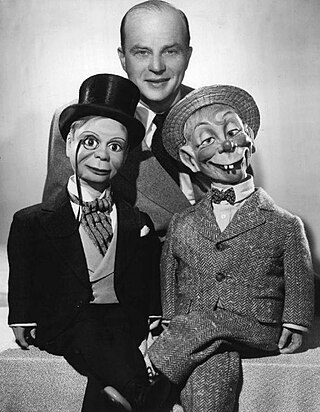
Edgar John Bergen was an American ventriloquist, comedian, actor, vaudevillian and radio performer. He was best known for his characters Charlie McCarthy and Mortimer Snerd. Bergen pioneered modern-day ventriloquism and has been described by puppetry organization UNIMA as the “quintessential ventriloquist of the 20th century”. He was the father of actress Candice Bergen.
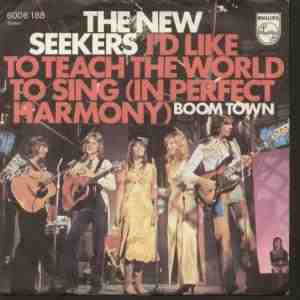
"I'd Like to Teach the World to Sing (In Perfect Harmony)" is a pop song that originated as "True Love and Apple Pie", by British hit songwriters Roger Cook and Roger Greenaway, and sung by Susan Shirley.

Allan Jones was an American tenor and actor.

Kitty Carlisle Hart was an American stage and screen actress, opera singer, television personality and spokesperson for the arts. She was the leading lady in the Marx Brothers movie A Night at the Opera (1935) and was a regular panelist on the television game show To Tell the Truth (1956–1978). She served 20 years on the New York State Council on the Arts.

Axel Stordahl was an American arranger and composer who was active from the late 1930s through the 1950s. He is perhaps best known for his work with Frank Sinatra in the 1940s at Columbia Records. With his sophisticated orchestrations, Stordahl is credited with helping to bring pop arranging into the modern age.

Fresca is a grapefruit-flavored citrus soft drink created by The Coca-Cola Company. Borrowing the word Fresca from Italian, Spanish and Portuguese, it was introduced in the United States in 1966. Originally a bottled sugar-free diet soda, sugar sweetened versions were introduced in some markets.
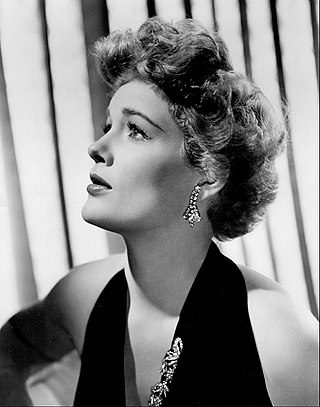
Jean Hagen was an American actress best known for her role as Lina Lamont in Singin' in the Rain (1952), for which she was nominated for an Academy Award for Best Supporting Actress. Hagen was also nominated three times for an Emmy Award for Best Supporting Actress in a Comedy Series for her role as Margaret Williams on the first three seasons (1953–56) of the television series The Danny Thomas Show.

Jessica Valentina Dragonette was a singer who became popular on American radio and was active in the World War II effort.

Rita Ann Johnson was an American actress.

Wendy Barrie was a British-American film and television actress.
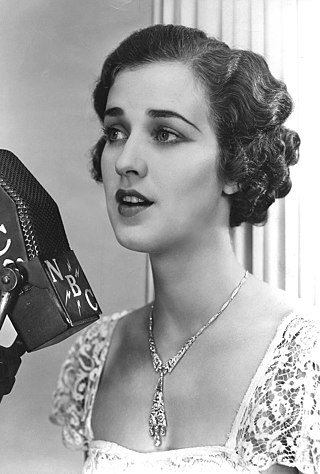
Ellen Jane Froman was an American actress and singer. During her thirty-year career, she performed on stage, radio, and television despite chronic health problems due to injuries sustained in a 1943 plane crash.

Coke Time with Eddie Fisher is an American musical variety television series starring singer Eddie Fisher which was broadcast by NBC on Wednesday and Friday nights from 7:30 to 7:45 p.m. Eastern Time on Wednesdays and Fridays, from April 29, 1953, to February 22, 1957. It was not seen during the summer months.. The opening theme was "May I Sing to You".

The Chase and Sanborn Hour is the umbrella title for a series of American comedy and variety radio shows sponsored by Standard Brands' Chase and Sanborn Coffee, usually airing Sundays on NBC from 8 p.m. to 9 p.m. during the years 1929 to 1948.
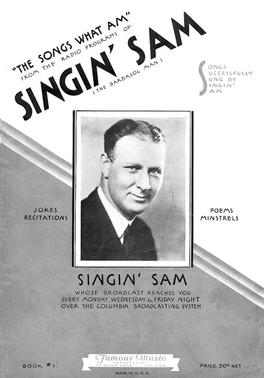
Singin' Sam aka Harry Frankel was a minstrel performer, vaudevillian and popular personality during the early days of radio. He was best known as "Singin' Sam, the Barbasol Man" for his long association with that company.

Coke Studio is an Indian music series featuring live musical performances by various artists, recorded in the studio. It showcases classical musical genres of the Indian subcontinent such as Hindustani, Carnatic, Indian folk, as well as contemporary hip hop, rock, and pop music. The program's concept originated in Brazil and has subsequently expanded its reach worldwide.
Joan Murray was the first African-American woman to report the news on a major network show. She was employed by CBS in 1965 after writing a letter to CBS-TV requesting they hire her as a news broadcaster.
Hollywood Hotel is an American radio program that was broadcast in the 1930s. It featured Hollywood stars in dramatized versions of then-current movies and "helped to make Hollywood an origination point for major radio programs." Radio historian John Dunning called the program, sponsored by Campbell Soup Company, "the most glamorous show of its time." The program was the inspiration for the 1937 Warner Brothers movie of the same title, which featured Louella Parsons as herself.

Joan Blaine was an American actress best known for her work in soap operas on old-time radio.
Avalon Time is an American old-time radio comedy/variety program that ran from 1938 to 1940 on NBC's Red Network. The program was named after its sponsor, Avalon cigarettes. Over the course of its run, Avalon Time was also sponsored by Sir Walter Raleigh Pipe Tobacco and the Bulova Watch Company.
Loretta Lee was an American singer in the first half of the 20th century.
References
- 1 2 3 Dunning, John (May 7, 1998). On the Air: The Encyclopedia of Old-Time Radio. Oxford University Press, USA. p. 624. ISBN 978-0-19-507678-3 . Retrieved April 8, 2024.
- ↑ "Kitty Carlisle Heads Stars in 'The Song Shop'". The St. Louis Star and Times. August 21, 1937. p. 16. Retrieved April 8, 2024– via Newspapers.com.
- ↑ "New Shows Ahead: Old Favorites Called Back to the Studios As Autumn Gives the Cue" . The New York Times. August 22, 1937. p. X 10. Retrieved April 8, 2024.
- 1 2 "Singin' Sam Sings". The Shreveport Journal. October 15, 1937. p. 6. Retrieved April 8, 2024– via Newspapers.com.
- ↑ Barrows, Nancy (December 1937). "Starting at the Top". Radio Stars. pp. 26–27, 62–65. Retrieved April 9, 2024.
- ↑ "Kitty Carlisle Off 'Song Shop,' Virginia Rea Appears as Guest". The Knoxville News-Sentinel. January 14, 1938. p. 22. Retrieved April 9, 2024– via Newspapers.com.
- ↑ "Orchestras - Music". Radio Daily. March 14, 1938. p. 5. Retrieved April 9, 2024.
- ↑ "Main Street". Radio Daily. January 28, 1938. p. 4. Retrieved April 9, 2024.
- ↑ "Radio Personals". Motion Picture Daily. September 21, 1937. p. 15. Retrieved April 9, 2024.
- 1 2 "Song Shop". Motion Picture Daily. September 13, 1957. p. 6. Retrieved April 9, 2024.
- 1 2 3 "'Coca Cola Song Shop'". Radio Daily. October 18, 1937. p. 7. Retrieved April 9, 2024.